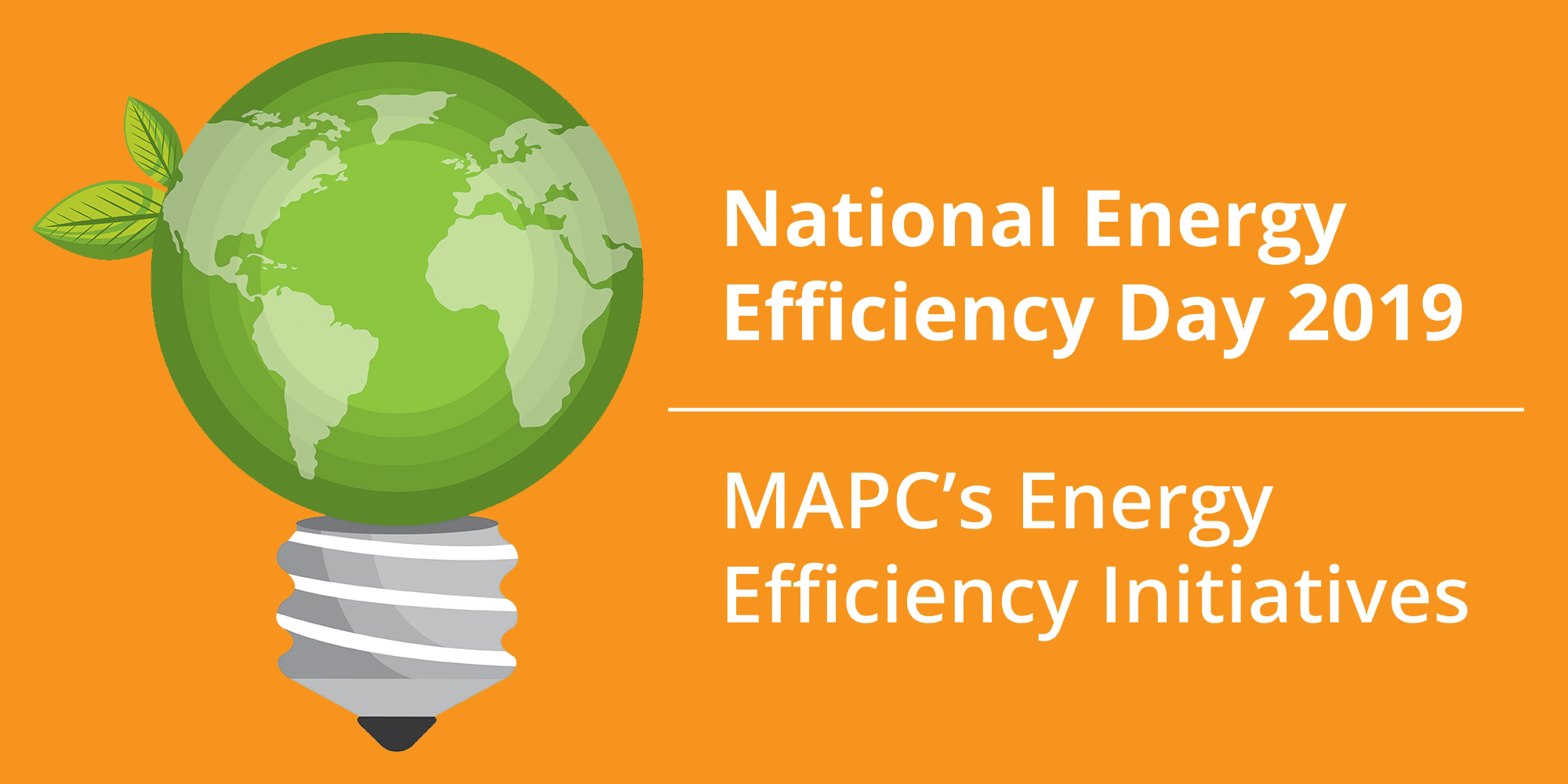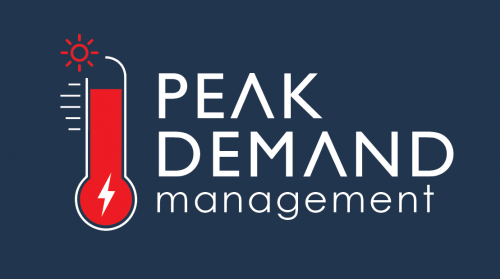
October 2 is National Energy Efficiency Day, and MAPC is joining with other regional and national organizations to highlight the advantages of energy efficiency – the cheapest and quickest way to lower energy use, cut utility bills, and reduce carbon pollution. Reducing energy used by municipalities, businesses, and individual homes benefits everyone, especially energy bill payers and the planet!
Actions like converting municipal heating and cooling to renewable systems, improving the built environment through energy-efficient building codes, and converting to LED lights can have a big impact when done on a municipal, region-wide, or state-wide scale.
Massachusetts is a national leader in energy efficiency and was just ranked the number one state in the nation in the American Council for an Energy Efficient Economy’s State Energy Efficiency Scorecard for the ninth year in a row. MAPC is proud to participate on the MA Energy Efficiency Advisory Council to support the state’s continued success in efficiency. We also know that we can - and must - do so much more. To meet the challenges of climate change, the state will need to build on the continued progress of the EEAC to move toward deeper energy efficiency standards for all new and existing building construction as well as in lighting, heating and cooling, energy storage, demand management, and more.
Read on to find out how MAPC is promoting energy efficiency in the Greater Boston region!
Clean Heating and Cooling
 Thermal energy consumption for heating and cooling accounted for 39 percent of Massachusetts’ total energy consumption in 2016 – and oil and natural gas make up 92 percent of fuel use in the thermal energy sector. Obviously, there’s significant opportunity and need to offset this fossil fuel use. Clean heating and cooling technologies use renewable or highly-efficient alternatives to generate heat, chilled air, or hot water.
Thermal energy consumption for heating and cooling accounted for 39 percent of Massachusetts’ total energy consumption in 2016 – and oil and natural gas make up 92 percent of fuel use in the thermal energy sector. Obviously, there’s significant opportunity and need to offset this fossil fuel use. Clean heating and cooling technologies use renewable or highly-efficient alternatives to generate heat, chilled air, or hot water.
The clean heating and cooling industry could create between 1,600 and 5,900 jobs in Massachusetts and could reduce the state’s greenhouse gas emissions by over two million tons in less than 10 years. Aging infrastructure means that many buildings are ready for boiler replacements and upgrades, and hotter summers mean that more residents and businesses are installing air conditioning. These factors provide a significant opportunity to increase energy efficiency when heating and cooling our municipal buildings, businesses, and homes.
MAPC’s white paper and webinar, Hot Cool Clean: Clean Heating and Cooling Opportunities for Massachusetts Municipalities, highlight the technologies and incentives that can provide municipalities with cost-effective, low-carbon solutions to heat and cool their public buildings.
Learn more about clean heating and cooling here.
Building Codes for Climate
Improving energy efficiency within the building energy code is one of the most effective ways to reduce greenhouse gas emissions in our region while providing multiple co-benefits, from lower utility bills to better ventilation and enhanced resilience. An energy-efficient code should be a tool in any municipality's toolbox when seeking to make progress toward Net Zero or other climate-related targets.
MAPC provides resources for climate-smart building codes and has been working with the Energy Efficient Codes Coalition (EECC), Northeast Energy Efficiency Partnership (NEEP), Massachusetts Climate Action Network (MCAN), and Sierra Club Massachusetts Chapter to encourage Massachusetts municipalities to register to vote for a more energy efficient and climate-smart 2021 International Energy Conservation Code.
Learn more about building codes for climate here.
LED Streetlights
MAPC helps cities and towns access state grant funding that covers 30 percent of the cost of LED streetlight materials and installation. These LED streetlights can reduce energy use and greenhouse gas emissions by 50 to 70 percent compared to existing lights.
Over the last three years, MAPC has worked with 61 municipalities to retrofit over 97,000 streetlights to LEDs. Now, we’re working with 18 more communities to retrofit over 19,000 additional lights. All of these LED streetlights are “control-ready” – meaning they can pair with devices that set streetlights on a regular schedule, automatically brighten or dim them, and provide real-time maintenance information. Several communities have installed wireless controls with dimming schedules already, thereby decreasing energy use and GHG emissions even more.
Learn more about our LED streetlight retrofit program.
Peak Demand
Since 2015, MAPC has helped municipalities save hundreds of thousands of dollars through peak demand management at their largest facilities.
During times of high electricity demand - usually on very hot summer days - our dirtiest fuel sources come onto the grid. Reducing demand during grid-wide peaks has an even bigger impact on emissions than reducing electricity demand during other times does.
In order to ensure that there is enough electric “capacity” available on the grid to meet demand in future years, the grid operator ISO-New England (ISO-NE) has a program that pays energy generators if they meet future generation commitments. To make these payments, ISO-NE assesses a capacity charge, which is incorporated into your electricity supply rate. ISO-NE determines the quantity of capacity to charge your facility solely based on the demand in your facility during the annual peak hour on the grid the previous year. Given the right forethought, this advanced planning by ISO-NE provides municipalities the opportunity to save big the following year by “load-shedding,” or reducing consumption, during the expected annual peak hour each summer. Saving big can equal as much as 30 percent of a municipal building’s electric bill.
MAPC runs our own free Peak Electricity Demand Notification program for our municipalities to learn how to reduce demand and the costs and emissions associated with capacity charges. In 2018, this program saved 18 cities and towns $117,000 and helped the City of Melrose reduce its load by 1,012kW.
Learn more about our peak demand notification program.
Net Zero
Net zero goal setting, planning, and implementation offers each city and town the framework to take tangible steps to prevent and reduce the effects of climate change. Many cities and towns in our region are already taking action by creating local energy action plans, becoming designated as Green Communities, and investing in renewable energy. These efforts are the foundation of a net zero framework for holistic climate planning that can enable municipalities to address not just energy use, but also optimize benefits to the environment, public health, the economy, equity, and more.
MAPC is currently leading a project with the Towns of Arlington and Natick and the City of Melrose to develop a net zero plan for each municipality based on updated community-wide greenhouse gas inventories. This multi-municipality approach will allow communities to learn from each other and share best practices as they develop their inventories and plans. The Net Zero project will inform MAPC’s Zero to 101 Initiative and Net Zero Municipal Playbook, serving to support communities across Massachusetts to set ambitious climate goals, create plans, and take action. Through this project, MAPC will develop and launch shared resources for communities in Massachusetts to use to support their net zero planning.
Learn more about MAPC’s net zero planning.
Green Communities
The Massachusetts Department of Energy Resources’ Green Communities Designation and Grant Program provides funding to municipalities who have been designated as Green Communities. Over the years, MAPC has supported close to 20 cities and towns to become designated Green Communities and many more to access the designation and competitive grants and strategize how best to optimize their energy conservation measures. The 10 municipalities that MAPC guided through the Green Communities designation process in just the last three years were awarded over $1.64 million in municipal clean energy grants to complete energy conservation and renewable energy projects.


